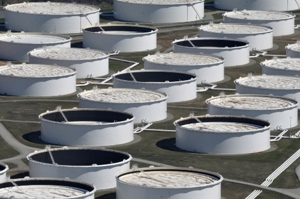Oil rises as U.S. inflation cools
(Reuters) - Oil benchmark Brent futures breached $80 a barrel for the first time since May on Wednesday after U.S. inflation data suggested the interest rate hike cycle in the world's biggest economy is set to finally cool.
Data released on Wednesday showed U.S. consumer prices rose modestly in June and registered their smallest annual increase in more than two years as inflation continued to subside.
Markets expect one more interest rate rise, but that the U.S. rate-hiking cycle has likely peaked. Higher rates can slow economic growth and reduce oil demand.
"This is the lowest number since the pandemic ... but it is important to keep in mind that this is still a transitory situation. But overall, traders are cheering this event," said Naeem Aslam, chief investment officer at Zaye Capital Markets, describing the inflation figures.
Brent futures were 51 cents up at $79.91 a barrel by 1256 GMT, having risen as high as $80.05 earlier. U.S. West Texas Intermediate (WTI) crude was up 62 cents at $75.45 a barrel.
A weaker dollar, optimism surrounding Chinese stimulus and U.S. stockpile data were also supporting the positive sentiment, said Fiona Cincotta, senior financial markets analyst at City Index.
Meanwhile, forecasts from the U.S. Energy Information Administration (EIA) and the International Energy Agency (IEA) point to the market tightening into 2024.
The IEA expects the oil market to stay tight in the second half of 2023, citing strong demand from China and developing countries combined with supply cuts from leading producers. New forecasts from the IEA are expected this week.
"The oil balance gets tighter either when supply is downgraded, or demand is revised up. If both happens at the same time the change can be seismic," said PVM analyst Tamas Varga referring to the EIA's outlook.
"Clearly, it is not worried about inflation-induced recession that could potentially dent global oil consumption."
Top producer Saudi Arabia pledged last week to extend a production cut of 1 million bpd in August, while Russia will cut exports by 500,000 bpd.







Comments